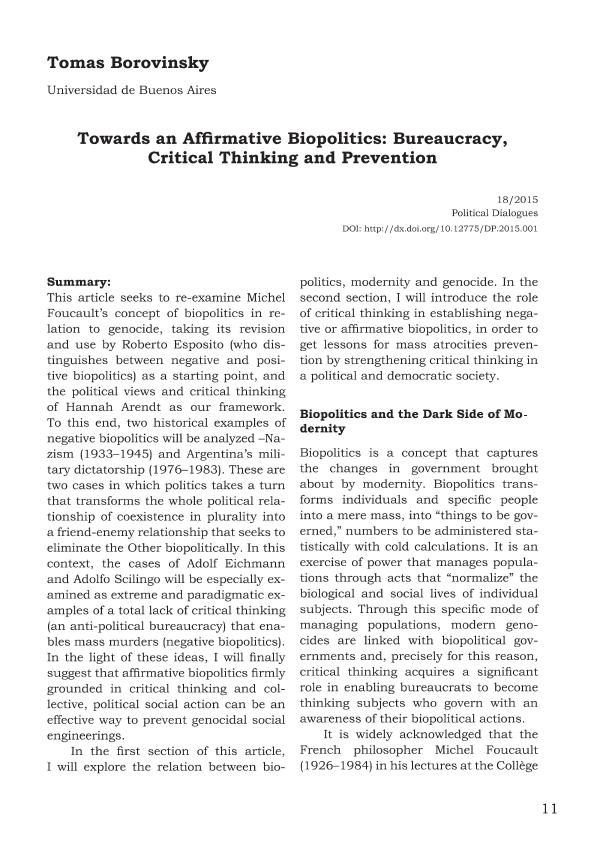Mostrar el registro sencillo del ítem
dc.contributor.author
Borovinsky, Tomás Guido

dc.date.available
2018-07-27T17:12:26Z
dc.date.issued
2015-01
dc.identifier.citation
Borovinsky, Tomás Guido; Towards an Affirmative Biopolitics: Bureaucracy, Critical Thinking and Prevention; Nicolaus Copernicus University; Dialogi Polityczne; 18; 1-2015; 1-13
dc.identifier.issn
1730-8003
dc.identifier.uri
http://hdl.handle.net/11336/53306
dc.description.abstract
This article seeks to re-examine Michel Foucault?s concept of biopolitics in relation to genocide, taking its revision and use by Roberto Esposito (who distinguishes between negative and positive biopolitics) as a starting point, and the political views and critical thinking of Hannah Arendt as our framework. To this end, two historical examples of negative biopolitics will be analyzed ?Nazism (1933-1945) and Argentina?s military dictatorship (1976-1983). These are two cases in which politics takes a turn that transforms the whole political relationship of coexistence in plurality into a friend-enemy relationship that seeks to eliminate the Other biopolitically. In this context, the cases of Adolf Eichmann and Adolfo Scilingo will be especially examined as extreme and paradigmatic examples of a total lack of critical thinking (an anti-political bureaucracy) that enables mass murders (negative biopolitics). In the light of these ideas, I will finally suggest that affirmative biopolitics firmly grounded in critical thinking and collective, political social action can be an effective way to prevent genocidal social engineerings.
dc.format
application/pdf
dc.language.iso
eng
dc.publisher
Nicolaus Copernicus University
dc.rights
info:eu-repo/semantics/openAccess
dc.rights.uri
https://creativecommons.org/licenses/by-nc-sa/2.5/ar/
dc.subject
Foucault
dc.subject
Arendt
dc.subject
Biopolitica
dc.subject.classification
Ciencia Política

dc.subject.classification
Ciencia Política

dc.subject.classification
CIENCIAS SOCIALES

dc.title
Towards an Affirmative Biopolitics: Bureaucracy, Critical Thinking and Prevention
dc.type
info:eu-repo/semantics/article
dc.type
info:ar-repo/semantics/artículo
dc.type
info:eu-repo/semantics/publishedVersion
dc.date.updated
2018-07-20T17:57:39Z
dc.journal.number
18
dc.journal.pagination
1-13
dc.journal.pais
Polonia

dc.journal.ciudad
Toruń
dc.description.fil
Fil: Borovinsky, Tomás Guido. Consejo Nacional de Investigaciones Científicas y Técnicas; Argentina. Universidad de Buenos Aires; Argentina
dc.journal.title
Dialogi Polityczne
dc.relation.alternativeid
info:eu-repo/semantics/altIdentifier/url/http://apcz.pl/czasopisma/index.php/DP/article/view/7692
dc.relation.alternativeid
info:eu-repo/semantics/altIdentifier/doi/https://dx.doi.org/10.12775/DP.2015.001
Archivos asociados
